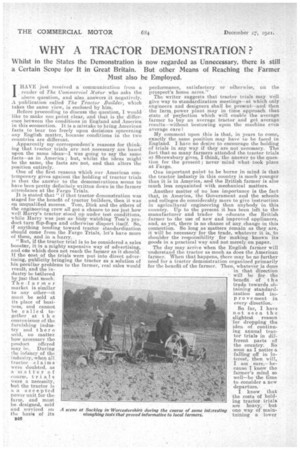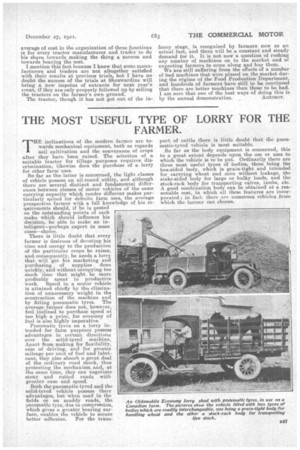WHY A TRACTOR DEMONSTRATION?
Page 28

Page 29

If you've noticed an error in this article please click here to report it so we can fix it.
Whilst in the States the Demonstration is now regarded as Unnecessary, there is still a Certain Scope for It in Great Britain. But other Means of Reaching the Farmer Must also be Employed.
IHAVE just received a communication_ from a , reader of The Commercial Motor who asks the above question, and also ansWers it negatively. A publication called The Tractor Builder, which takes the same view, is enclosed by him.
Before proceeding to discuss the question, I would like to make one point clear, and that is the differetice between the conditions in England and America in this eennection. It is a mistake to bring American facts to bear too freely upon decisions concerning any English matter, because conditions in the two countries are different.
Apparently my correspondent's reasons for thinking that tractor trials are not necessary are based upon the same ideas—I was going to say the same facts—as in America ; but, whilst the ideas might be the sam.e, the facts are not, and that alters the position entirely. One of the first .reasons which our American contemporary gives against the holding of tractor trials is that the ansWer to the demonstrations seems to have been pretty definitely written down in the farmer attendance at the Fargo Trials. It is stated that " if that tractor demonstration was staged for the benefit of tractor builders, then it was an unqualified success. Tom, Dick and the others of Ole engineering crew all got a chance to see just how well Harry's tractor stood pp under test conditions, while Harry was just as busy watching Tom's product turn flip-flops and otherwise disport itself. So,. if anything .tending toward tractor standardization should come from the Fargo Trials, let's have more of them, and in a hurry..
"But, if the tractor trial is to be considered a sales booster, it is a mighty expensive way of advertising, and one which does not reach the farmer as it should. ].f. the cost of the trials were put into direct advere tising, publicity bringing the tractor as a solution of his peculiar problems to the farmer, real sales would result, and the industry be bettered by just that much. The farmer market 1.8 similar to any other-it must be sold at its place of business, and cannot be called together at t h e convenience of the furnishing industry and there sold, no matter how necessary the product offered may be. During the infancy of the industry, when all tractor claims were doubted, as a ni. a t ter of course. trials were a necessity, but the tractor is an accepted power unit for the farm, and must he designed, sold and serviced on A scene at Suckley in-Worcestershire during the course of some interesting the basis of its The day may. arrive when the English farmer will -understand the tractor as much as does the American farmer. When that happens there may be no further need for a tractor demonstration organised primarily for the benefit of the farmer. Then, whatever is done
B4t3 performance, satisfactory or otherwise, on the prospect's home acres." The writer suggests that tractor trials may well give way to standardization meetings—at which only engineers and designers shall be present—and then the farm_ power plant may in time approach that state of perfection which will enable the average farmer to buy an average tractor and get average results—without bestowing upon the machine even average care !
My comment upon this is that, in years to come, exactly the same position may have to be faced in England. I have no desire to encourage the holding of trials in any way if they a-re not necessary. The . fact that so many farmers attended the tractor trials at Shrewsbury gives, I think, the answer to the question for the present; never mind what took place at Fargo.
One important point to. be borne in mind is that the tractor industry in this country is much younger than it is in America., and the British farmer is also flinch less acquainted with meohanical matters.
Another matter of no less importance is the fact that, in America, the Government and the schools and colleges do considerably more to give instruction in agricultural engineering than anybody in this country. Up to the present it has been left to the manufacturer and trader to educate the British farmer to the use of new and improved appliances, and, as yet, there is no chance of any change in this connection, So long as matters remain as they are,' it will be necessary for the trade, whatever it is, to shoulder the responsibility for making known its goods in a practical way and not merely on paper. The day may. arrive when the English farmer will -understand the tractor as much as does the American farmer. When that happens there may be no further need for a tractor demonstration organised primarily for the benefit of the farmer. Then, whatever is done
in that direction will be for the benefit of the trade towards oiltaining standardization and. imp To ve ment in every direction.
So far, I have not seen the slightest reason for dropping the idea of continuing annual tractor trials in different parts of the country. So soon as I notice a falling off in 'interest, then will, I am sure,—because I know the farmer's mind so well—be the time to consider a new departure.
I know that the costs of hold• ing tractor trials are heavy, but one way of maintaining a -lower average of cost in the organization of these functions is for every tractor manufacturer and trader to do his share towards making the thing a success and towards bearing the cost. I mention this fact because I know that some maimfaoturers and traders are not altogether satisfied with their results at previous trials, but I have no doubt the success of the trials at Shrwwardine will bring a new impetus of entrants for next year's event, if they are only properly followed up by selling the tractors on the farmer's own ground.
The tractor, though it has not got out of the in
fancy stage, , is recognized by farmers now as an actual fact, and there will be a constant and steady demand for it. It is not now a question of rushing any number of machines on to the market and of expecting farmers to come along and buy them. We are still suffering from the effects of a number of bad machines that were placed on the market during the regime of the Food. Production Department, and hundreds of farmers have still to be convinced that there are better machines than those to be had. I am sure that one of the best ways of doing this is
by the annual demonstration. ACRIMOT.
































